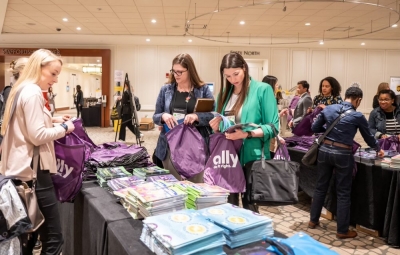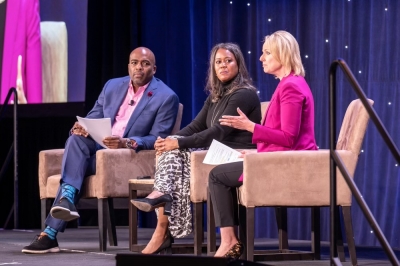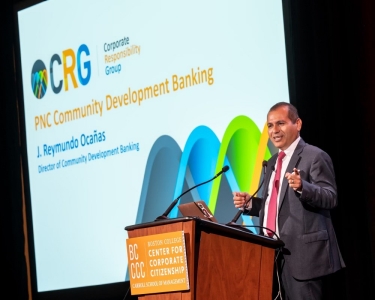WEBINAR: This webinar explores how to measure and communicate your organization's social impact with proven frameworks and strategies that matter to stakeholders.
2022 Corporate Citizenship Conference Day 2 - Afternoon: Better approaches to community partnerships

Attendees entered the second half of day two here at the 2022 International Corporate Citizenship Conference eager to build on the insights and strong connections they’d gained this morning. The remainder of the day explored the dynamic partnerships that result from addressing systemic issues.
Most attendees started their afternoon with a second round of breakout sessions, which featured topics ranging from net zero, to intergenerational employee engagement, to diversity, equity, and inclusion. For attendees seeking a break from the hustle and bustle, there was also the chance to wind down in the Vertex Conversation Lounge.
Participants were also excited to learn that they were successful in packing more than 500 financial education kits for a local school in the Boston area, thanks to Ally’s generous sponsorship of this year’s volunteer project.

The power of strategic partnerships
Attendees settled in for an honest and candid session led by Altria, “The power of strategic partnerships.” As a market leader in the U.S. tobacco industry, Altria is seizing an opportunity to shape a better future for adult tobacco consumers, employees, shareholders, and society. In this session, Jennifer Hunter, Altria’s senior vice president of corporate citizenship, took the stage to discuss how the company is working actively with a coalition of partners to address underage smoking and other youth issues through strong stakeholder relationships.
Hunter shared that while underage smoking rates are at generational lows, a rapid rise in youth e-vapor consumption/use rates in recent years indicate that this trend may be reversing. She said that Altria is partnering with youth organizations to continue to bring these numbers down such that they can prevent underage use of their products.
“We have the privilege of working with some of the top organizations that contribute to the healthy development of young people,” said Hunter. “We invest in proven, effective programs through a portfolio of partners reaching 17 million kids—including an investment in parent communication and resource prevention.”
Hunter was then joined by longtime partner Jennifer Sirangelo, president and CEO of the National 4-H Council, which was the first national youth-serving organization to collaborate with Altria, beginning the relationship in 1998. Immanuel Sutherland, senior manager, community impact at Altria, also joined to moderate a panel discussion about how corporate partners can best collaborate with youth and youth-serving organizations.
“It’s powerful when you partner with a nonprofit that’s courageous,” said Sutherland, to start. “I’m going to ask the question probably on the minds of many people in this room: Why would 4-H partner with a tobacco company?”
“This question is not a one-time decision. Our relationship with Altria as a partner is remade on a regular basis,” replied Sirangelo. “The reason we partner with Altria is rooted in shared values, as it is in all our corporate partnerships. You heard Jennifer talk about the commitment to not have young people using their products. I have seen that commitment go all through the company.”
Sirangelo explained that the partnership—spanning 25 years and more than $80 million—started with an alignment of values, and 4-H is proud to say they have been part of the significant public health achievement bringing down youth smoking.
Along the way, Altria has been a strong partner, contributing not only program funds but also capacity building investments and research, including a 10-year longitudinal study to look at the impact of Altria’s youth smoking prevention. Sirangelo also expressed appreciation for Altria’s willingness to address her senior leaders at National 4-H Council, answering questions about the nature of the partnership and mutually beneficial outcomes.
After this thought-provoking session, attendees filed out of the America Ballroom for a well-deserved break. In the foyer, they enjoyed a cocktail reception replete with refreshments and great conversation.

Building a parent nation
A short while later, attendees reconvened in the ballroom for dinner and engaging final session led by PNC Bank: Fulfilling society’s promise: How corporate America can support families in powering children’s potential. Opening the session was J. Reymundo Ocañas, executive vice president, director of community development banking, PNC Bank.
Ocañas, a longtime member of BCCCC and its Executive Forum, expressed his excitement to be in the room with fellow corporate citizenship professionals. “Everything you do every day has so much meaning,” said Ocañas. “I am a graduate of the Center’s executive education programs, and I can tell you that it’s so important to build up your skill set and accreditations. It’s also so important that you learn from each other at this conference.”
From a company perspective, Ocañas also discussed the company’s $80 billion community benefits plan, which was the result of listening sessions with hundreds of stakeholders. As a result of those discussions, PNC identified affordable housing as the area of the greatest need and has created several innovative products and services to support that need in low- and moderate-income communities.
Ocañas introduced his colleague PNC Bank’s Executive Vice President and Director of Community Affairs, Sally McCrady, who described the company’s philanthropic commitments to support economic development education, and racial and social justice. McCrady also outlined the alignment of the foundation with the company’s overall business model.
“Our philanthropic model at PNC is that we are absolutely locally driven, a focus that is consistent with our PNC Bank ‘Main Street’ model” said McCrady. “Each one of our markets knows the needs of our communities and local nonprofits best, so we trust them to make the decisions about where we support our funding.”
McCrady also detailed PNC’s Grow up Great Program, a $500 million, multi-year, bilingual school readiness initiative reaching low- and moderate-income children from birth to age five. Founded in 2004, Grow up Great has awarded $207 million in grants and supported 8 million children in grant-funded programs and mobile educational tours
A critical part of this success is partnerships—because while the team has expertise in business operations of banking, they understand that they need partners to guide and provide the tools needed for the program. One of those partners is Dr. Dana Suskind, co-director of TMW Center for Early Learning + Public Health, and author of Parent Nation: Unlocking Every Child's Potential, Fulfilling Society's Promise, who next took the stage.
Building upon her work as a pediatric physician and surgeon, Suskind shared her philosophy that every caregiver has the ability to ‘build their children’s brains’—but doesn’t always have the opportunity. While there are more than 60 million parents in the U.S. who have children under 18, Suskind said, half of Americans live in so-called “childcare deserts,” and fewer than 10% of those programs are considered high quality.
“That means millions of parents do not have adequately nurturing childcare during the formative early years,” continued Suskind, which described three key things children need in this period: security (i.e., protection from toxic stress), enrichment (i.e., rich language input) and time (i.e., the opportunity for nurturing interactions with caregivers). What their parents need is the ability to provide these things.
“Any business interested in increasing profits should be calling for a re-investment in today’s family, which will sow the seeds for the next generation of highly skilled, highly educated, and highly productive workers—not to mention support the current working parents of today,” concluded Suskind. “All members of a society benefit when its children receive a fair start in life.”
Suskind praised PNC’s Grow Up Great program as a great example of a program that supports parents in the development of children’s brain growth. “I love to see the many ways that PNC is living up to its own ideals and continually trying to do better,” said Suskind. “I truly believe other employers would be wise to follow suit.”
With this enriching discussion, the day concluded. Attendees left the America Ballroom with a great deal of insights, ideas, and best practices to infuse into their corporate citizenship work—and looked forward to the final day of the conference.
We’ll be blogging throughout the 2022 International Corporate Citizenship Conference to give you daily recaps and deep dives into the event’s unique content. Visit the Corporate Citizenship Perspectives blog to follow along and recap the event.
Related Content
RESEARCH BRIEF - Researchers investigated how ESG activities help or hurt financial performance, using nine years of data from over 1,200 global companies.
RESEARCH BRIEF - Researchers analyzed 4 US energy exchange-traded funds (ETFs) over 15 years, including 2 dirty energy funds tracking fossil fuel companies and 2 clean energy funds tracking renewable energy companies.
RESEARCH BRIEF - Researchers conducted a survey, which measured perceptions of CSR and ethical leadership within the manufacturing and service industries.




